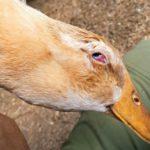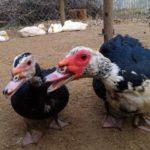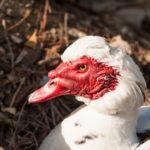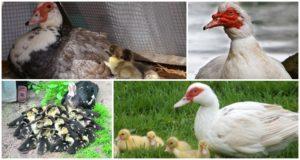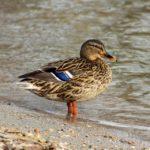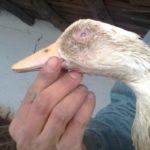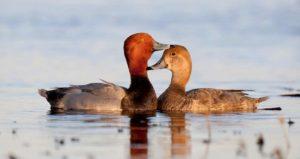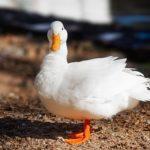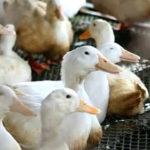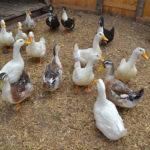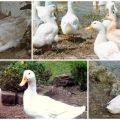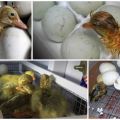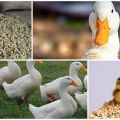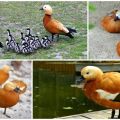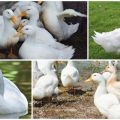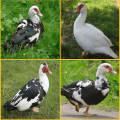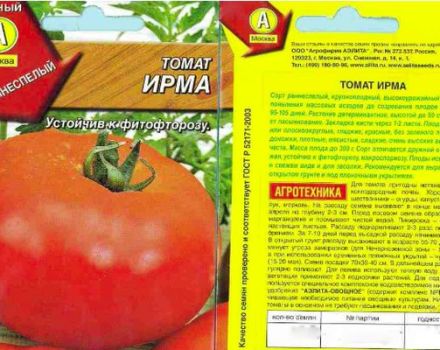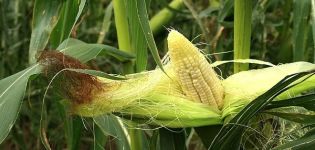Names and symptoms of indoctrination diseases and what to do, prevention
Indo-duck diseases can cause significant damage to the household. Their consequences are a decrease in the growth of a bird and weight gain, and even its death. There are many diseases of Indo-women, these are infections, helminthiases and non-infectious diseases. Any of them can occur on the farm, so you need to know their signs, how to treat diseases and prevent pathologies among the Indo-Ducks livestock.
What non-communicable diseases can Indo-women develop?
The causes of non-infectious pathologies are improper care and maintenance of the bird. Diseases affect the digestive system, metabolism.
Avitaminosis
Avitaminosis develops in the absence of a sufficient amount of vitamins in the body. A deficiency of any one vitamin compound is often created. But several may be missing at once. Signs - lethargy, poor appetite, developmental delay, loss of feathers, deformation of the limbs. A long absence of vitamins in the diet leads to the death of the bird.
Cloacite
This inflammation of the mucous membrane of the cloaca develops in females that lay eggs. The reason is the lack of minerals and vitamins. You can identify cloacite by the dirty fluff at the cloaca, reddening of this organ, and its covering with ulcers. Indo-woman loses weight and stops rushing.
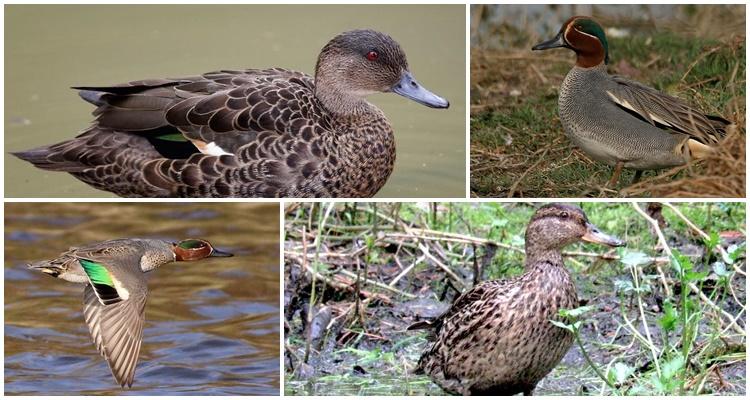
Treatment - the cloaca is washed with a solution of iodine or furacilin, and then smeared with tetracycline or zinc ointment. Prevention - put a container with shell rock or chalk in the house.
Goiter catarrh
The cause of the pathology is the feeding of the Indo-girls with moist, sticky food. Catarrh can be identified by the restless behavior of the bird. She stretches her neck, her goiter swells, a bad-smelling mixture comes out of her mouth.
Treatment - you need to take the indow, turn it upside down, run your hand over the goiter so that its contents spill out. Then do not feed the duck for 1 day, but you can give water. After feeding with liquid porridge. Prophylaxis - give Indo-women food that has a homogeneous structure.
Esophageal blockage
The esophagus of ducks is clogged with a foreign object that they can swallow. It can be determined by lack of appetite, hard goiter, weakness of the duck. Treatment - if it was not possible to remove the object from the throat of the bird, it is allowed to be slaughtered. Prevention - to prevent the appearance of large objects in the food of ducks, which they will try to swallow by mistake.
Food poisoning
Arises from the use of spoiled food, poisonous plants. Symptoms are indigestion, weakness, vomiting. Sometimes convulsions may occur. Therapy - give the duck water with activated charcoal. Prevention consists in feeding only fresh feed, cleaning the feeders from the remnants of not eaten food. You also need to make sure that no poisonous plants come across in the feed.
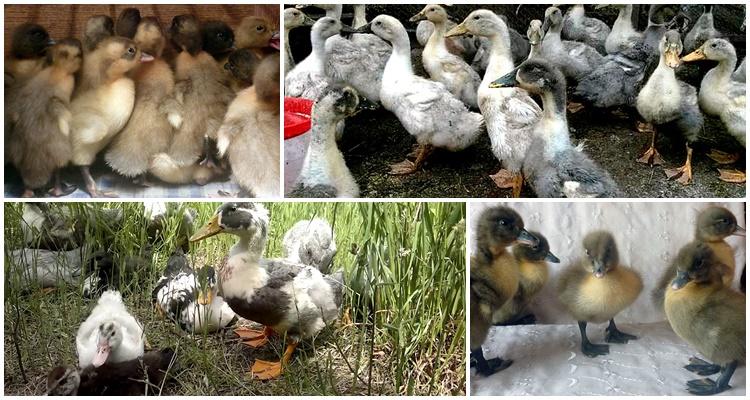
Rasklev
It arises from a lack of vitamins or crowded content of poultry in one, close to them, room. From the discomfort, the Indo-girls begin to peck at each other. They pluck feathers and peck paws. Treatment and preventive measures - feeding with nutritious food, keeping in a spacious poultry house. Cleaning the litter and replacing it with a new, dry one. Walking ducks in the fresh air.
Infectious diseases
Infections arise and spread in the house due to non-compliance with the rules of maintenance and care. Indo-ducks who live on a dirty, damp litter, in a cramped room that is not ventilated, are ill. If it is also cold, dark, the likelihood of developing diseases increases. The result of infectious diseases is the death of birds, partial or complete.
Paratyphoid
Little Indo-girls get sick with this disease and die, but adult birds can also get sick. Infection occurs through food, water, and breathing. In the acute form of pathology, the death of ducklings can be up to 80%. Recovered ducks will then lay 10-20% less eggs than usual. Treat ducks for paratyphoid fever with antibiotics for 1 week. Medicines are dissolved in feed.
Preventive measures include cleaning and disinfecting the poultry house, killing dead ducks with fire, and adding greens and yeast to the ducklings' diet.
Hepatitis
The infection affects the liver. Sick ducks are weak, breathing heavily, dropping their head and wings, falling on their side and struggling in convulsions. Treatment is prescribed by a veterinarian, medicines - antibiotics. Prevention - the destruction of rodents and insects in the poultry house, vectors of hepatitis pathogens and regular cleaning of the premises.
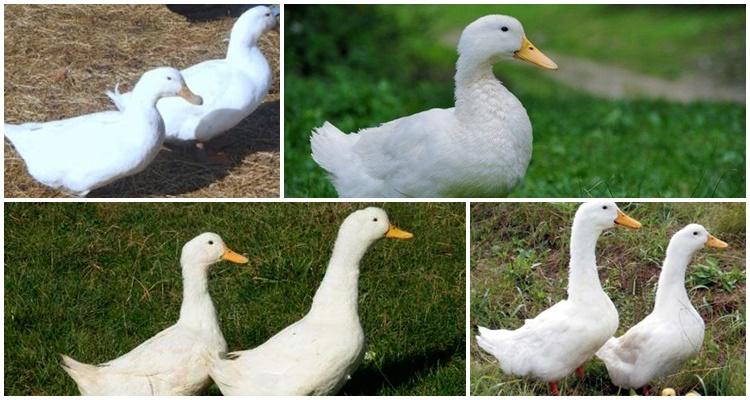
Coccidiosis
Coccidia affect the intestines of the Indoor. Coccidiosis affects young animals up to 1 month old. Pathogens enter the body of ducklings through water, food, contaminated with the droppings of sick birds. Coccidiosis can be determined by the feces, first green, then brown, with an admixture of blood. Ducklings do not eat, weaken, move slowly, their feathers ruffle. Coccidiosis is treated with anti-coccidiosis drugs specially designed for the treatment of this disease. Prevention consists in timely cleaning of the litter, cleaning the feeders and drinking bowls, and disinfecting the premises. Soldering ducklings with coccidiostatics has a good effect.
Pasteurellosis
Signs: weakness, wheezing, discharge from the mouth, loss of appetite. Indo-girls have swollen joints, diarrhea begins. There is no cure, the meat of such ducks cannot be eaten. Preventive measures: vaccination of young animals, disinfection of the poultry house, destruction of dead birds, insects and rodents.
Parasites
Parasites that can infect an Indo-duck are helminths and external parasites - lice, fleas and lice. Parasites interfere with the normal life of the bird, the work of internal organs. Lice bite ducks and can carry infections. Infected Indo-women stop rushing, lose weight.
Anthelmintic drugs are used against helminths, the bird is treated with sprays and powders against lice, a container with sand and ash is placed in the duckhouse. Pest infestation can be prevented by cleaning the house as often as possible.
Indo-duck women, despite good health, can suffer from infectious and non-infectious diseases. Birds can die if left untreated or permanently reduced performance.Every owner should learn to recognize the signs of diseases and know how to treat them.
